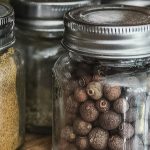Indian spices have quite the reputation. Indian foods are famous for the flavours and the great taste and of course the spices. Spices are known not only for the flavour boosting that they do but also for the medicinal values they hold. The most important thing to understand about spices is the amount to be used in the food. Any subtle change in the proportion of spices (spices in Indian) in the food can influence the taste greatly.
It is important to not over do the spices as they can come out really strongly, and we assure you nobody is going to be a fan of it. There are a lot of spices out there. We have brought to you some of the most commonly found spices in Indian kitchen to keep things simpler for you.
1. Cardamom
Green cardamom is the most commonly found in the Indian Kitchen. They are great flavour enhancers. They can be added to sweets, vegetarian and non-vegetarian gravies, biryanis, and even lassi. There are also black cardamoms, but they are used less frequently compared to green. They can be used as a whole or can be used in powdered form. Cardamom’s medicinal benefits include mouth freshening and aiding digestion.
2. Cumin
Cumin is yet another interesting spice used in Indian cooking. They add a refreshing yet smoky flavour to the dishes they’re added to. Cumin is the first added spice while cooking any dish. You need to make sure it is not overcooked as it may spoil the flavour. Cumin seeds can often be confused with the fennel seeds. Cumin comes with quite a lot of benefits. They can be added to boiling water. This water can be consumed throughout the day. This is told to improve digestion, and it is very good for pregnant women.
3. Black pepper
Black pepper is a therapeutic spice added to Indian spices. It’s most commonly used in powdered form. Pepper chicken and pepper idlis are quite famous dishes using black pepper. Black pepper is usually used as a whole in a south indian dish called “Pongal.”
4. Turmeric
Turmeric is the most commonly used spice in India. They are mostly used in ground form but they can also be used in fresh form. Turmeric is the best known antiseptic out there. It is also known for its anti-cancerous properties. Turmeric adds great flavour and colour to the dishes.
5. Cinnamon
Cinnamon is a mild spice used in a variety of Indian foods. They can be used in sweets to savouries to cakes and rolls. They are also used in whiskey and this adds great flavour to the drink. Cinnamon is the best mouth freshener and it also helps in weight loss. It is a super spice that you can see in all Indian kitchens.
6. Bay leaves
Bay leaves are mostly used in dried form. They are used in a variety of food items, mostly spicy. It has an alluring flavour to it. This is one of the reasons why Indian dishes smell great. It is important to not over do it and you need to remove the leaves once the dish is cooked.
7. Coriander
Coriander is yet another spice that is sure to occupy space in the Indian kitchen. Coriander can be used in both ground form as well as whole. The coriander seeds are small and aromatic. They add kind of citrus notes to the food.
8. Mustard
Black mustard seeds are widely used in India. They are very small in size and come in black, brown, or yellow colour. These seeds exhibit their flavour only when they are popped in hot oil. They are used in almost all dishes. North Indians use a lot of mustard oil in cooking.
9. Fenugreek
Fenugreek is a yellow colour whole spice found in Indian kitchens. They look like small wheat kernels and they taste a little bitter. You need to be careful with the amount of fenugreek you add to your add. Overdoing will definitely spoil the dish. They are also mainly used in batter for idli and dosa. Fenugreek is said to regulate body temperature.
10. Cloves
Cloves, which look like flower buds, are yet another spice found. They are aromatic and come with a lot of health benefits. Like any other spice, one cannot over do this spice, for they can be really overpowering. They are anti-bacterial and fight against cancer. Clove oil is very good at improving your oral health.


